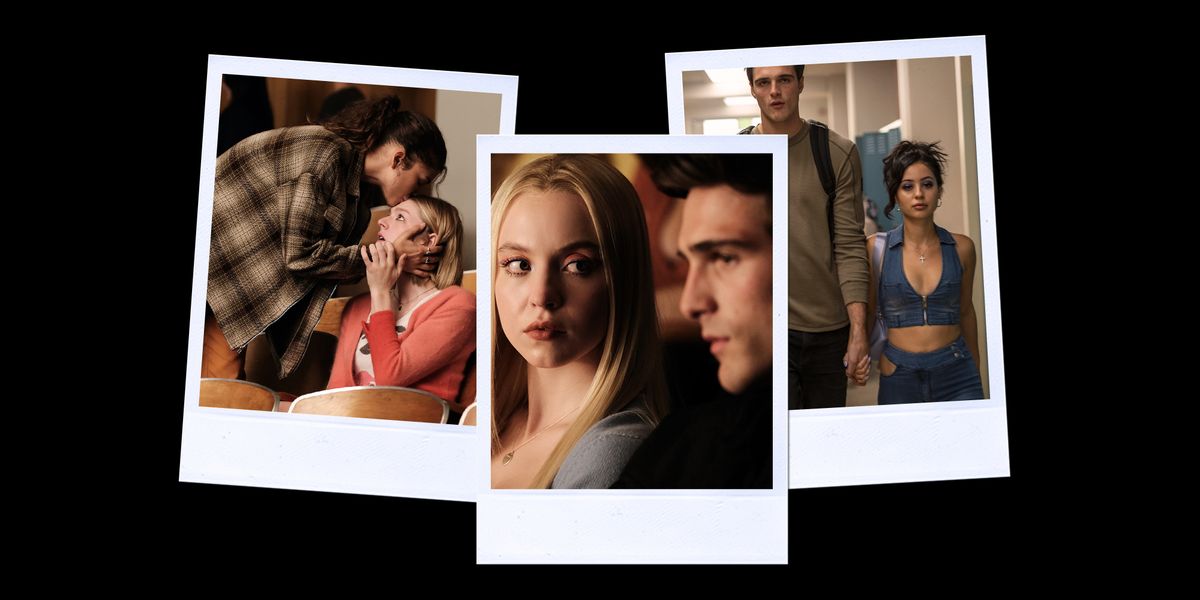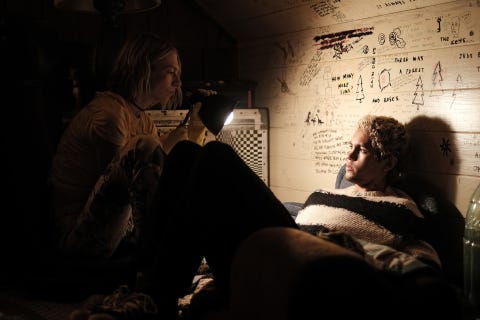Euphoria season 2 was quite the ride. It saw our favorite East Highland teens (plus Fez and Ash—and minus Nate) up to more shenanigans, still mostly propelled by sweet thrills, unhealed wounds, and an achingly familiar yearning for connection.
As discourse faithfully filled timelines and group chats with each episode, it seemed fitting to ask a specialist some of our most pressing questions about the show, specifically about the girls and their dysfunctional relationships: Why would Cassie do…*gestures vaguely*…all of that? How the heck would Maddy recover from all her trauma? And perhaps the biggest question of them all: Sure, Rue and Jules as end game would be adorable but is that relationship good for either of them?
We checked in with Licensed Clinical Psychologist, Dr. Catherine J. Mills, a Nationally Registered Health Service Psychologist, Certified Advanced Alcohol and Drug Counselor, and Certified Clinical Trauma Professional who works with adolescents, adults, and couples. In addition to psychotherapy services, Dr. Mills provides health and wellness coaching for women to prevent mental health disturbance and burnout, and has various self-care products, including an online self-care course titled, “The Mental Wealth Masterclass.”
“I really think that [Euphoria] is a good show to just explore various types of mental health issues,” Dr. Mills tells ELLE.com. “If there’s someone that reads the article, or they’re watching the show and they identify certain similarities in the characters, I encourage them to find a local therapist, a local psychologist to work through some of those things.”
Here, the good doctor provides insight into the psyche and trauma history of Euphoria teens, and what leaving their dysfunctional relationships behind and moving forward could look like in the real world.
Cassie & Nate
Cassie and Nate getting together was one of season 2’s biggest and most chaotic curveballs. While hooking up with your on-again, off-again girlfriend’s best friend is extremely shitty, it’s not exactly off-brand for Nate, who has a lengthy history of consciously inflicting harm on others when it serves his self-interests. However, many fans were perplexed by Cassie’s cardinal violation of girl code and left wondering, Why would she do that?
When it comes to Cassie’s general mental state, which connects to what motivates her actions, Dr. Mills believes there are multiple layers at play, like unresolved grief from her father’s abrupt absence. She had a healthy relationship with her dad before he walked out on the family during her childhood, and that likely sparked a severe fear of abandonment within Cassie. Those wounds seem to be a major driving force with Cassie’s history of struggling to say no, staying involved with guys she’s aware she doesn’t like, and staying involved with guys who’ve mistreated her—like sharing nudes and filming her during intimate moments without consent.
She desperately wants people to like her, explains Dr. Mills, because once you have that fear of abandonment, you go to extremes to not be left behind. “I think Cassie is addicted to love,” continues Dr. Mills, explaining that people can be addicted to substances, food, a range of things—including relationships and love. “When we’re in relationships, even when we hug someone, but especially when we’re intimate with someone, we get these oxytocin and dopamine and serotonin released. I think Cassie truly has a fear of abandonment and she’s addicted to these unhealthy relationships just as severely as Rue is addicted to the drugs. I think that’s what’s happening with her.”
Understandably, you may be thinking, there are so many guys in the world, why would Cassie sacrifice her closest friendship, and for a guy who she likely knows is abusive?
Cassie’s trauma history and her need to feel good in the moment may have trumped her ability to be empathetic to her friend, explains Dr. Mills. This could also explain why Cassie remained so committed to the “they were already broken up” stance when critiqued about the betrayal by family and friends.
Some fans have speculated that Cassie has undiagnosed Borderline Personality Disorder (BPD), a mental health disorder characterized by intense, unstable emotions and relationships as well as insecurity and self-doubt. From a medical standpoint, does she fit the bill? A person can’t technically be diagnosed with BPD until they are at least 18 years old, and other issues like complicated grief, as opposed to a personality disorder could be at play with Cassie, but Dr. Mills says the character would indeed fit the diagnostic criteria for Borderline Personality Disorder.
So, what would healing look like for Cassie? If she were a patient of Dr. Mills, the process would likely start with taking a session or two, sometimes more, to flesh out what trauma is, how it can manifest in your life, and what you can do to try to recover from it. This would look like an extensive review of your history–familial relationships, medical history, developmental issues–in the first and longest session (typically 90 minutes). Next would come establishing treatment goals, and working to achieve the set goals in follow-up sessions.
“Sometimes, especially with people who have experienced trauma, one of the first things we have to do is to even identify and help the person to see that what they experienced is a trauma,” Dr. Mills says of the process. “Something interesting that I’ve noticed, a number of people who actually are walking around with trauma disorders, they don’t realize that they have been traumatized. They just think, ‘Oh, this is just something that happened and I’m dealing with it.’”
Assisting Cassie with identifying sources of trauma in her life—the loss of her dad, possible emotional unavailability, and her mother’s alcohol dependency—and focusing on goals like developing a healthier relationship with herself, understanding her value outside of romantic relationships and being desired, and cultivating a strong sense of self would be an important part of her healing work.
Maddy & Nate
Where do we begin? While Maddy and Nate made sense in theory, especially within the bubble of high school—the popular cheerleader dates captain of the football team—their tumultuous relationship was a whirlwind of toxicity from its introduction. Of course, there’s the glaring issue of Nate’s emotional, psychological, and physical abuse of Maddy, which reaches new heights in season 2 when Nate begins a secret relationship with Maddy’s best friend while Maddy is trying to get back together with him. In one of his most terrifying moments, Nate even threatens Maddy with a gun.
The dysfunctional relationship Maddy grew up seeing between her parents, in addition to her desire for a life of ease and being taken care of, are major driving forces in her relationship with Nate. “I think Nate fits in with the picture that she created in her mind of what she wants her life to be,” says Dr. Mills. “We as human beings, when we’re growing and learning to navigate the world, we do what we see. So, if you are in a situation like with Maddy, you might end up in a relationship similar to what you see in your home with your parents. Dad is absent, not supportive, things like that.”
According to Dr. Mills, things get especially tough for girls who don’t have healthy father figures in their home or supportive adults to show them what a healthy relationship should look like—all while their brains are still developing and they’re still discovering who they are. Maddy and others in the predicament of lacking healthy relationship models and adequate guidance are learning for themselves how to date, how to spot and deal with red flags, how to discern whether someone they’re dating has good intentions or not, and how to set boundaries—but when you have less information and references of healthy relationships, spotting those red flags quickly or at all tends to be more challenging.
Maddy’s use of wardrobe and glam may also connect to her trauma. “You will see a number of people who have trauma histories use makeup and having a nice outfit and looking put together as armor, because just think about it, when you see someone that you view as attractive your automatic thought is, ‘Oh, where did you get that outfit? Oh, I love your eye makeup.’ We don’t typically say,‘How are you doing?’ We automatically go to, Oh, this person must have it all together because she looks so well put together. So, what it would do is it would take us back into our own insecurities as opposed to really thinking or even truly asking her, ‘Hey, are you okay?’”
As for Maddy’s healing work, Dr. Mills would definitely recommend trauma-focused therapy to process her relationship with Nate and working on her relationship with herself. Increasing her self-worth and having a health professional help her understand her immense value outside of her relationship would also be a game changer. “I think when she heals that, her relationship with herself, that will lead to her making healthier choices, which would mean getting involved with people, with other men who are healthier,” Dr. Mills says. Our relationships with ourselves are our longest lasting relationships, stresses the doctor, which connects to and informs how we navigate the world.
Rue & Jules
Many people have rooted for Rue and Jules, a.k.a. Rules, for good reason. It’s been endearing to see a queer relationship—especially the underrepresented pairing of a trans and cis girl—who deeply care for each other and who are trying to find their way in the world. But when you factor in Rue being in the midst of struggling with addiction, unhealthy coping mechanisms, and both her and Jules also having their own mental health struggles to work through, is Rules really in the best interest of either character?
The short answer: No. “With Jules and Rue, Rue is definitely codependent on Jules and I think Jules realizes that. It’s unhealthy for both of them,” Dr. Mills tells ELLE.com. “When you’re seeking for anyone outside of yourself to fill a void, it’s not fair to the other person because that’s too much weight for anyone to have to carry. They have their own mental health and psychological journey that they’re on. It’s unfair to yourself because you’re really setting yourself up for future unhappiness.”
As a general rule, health providers recommend that teens or anyone early in recovery avoid starting any type of romantic relationship until they have been sober for one year. As Dr. Mills explains, Rue and Jules keeping things in the good friend territory could have been a more mutually fulfilling relationship. That doesn’t mean there hasn’t ever been genuine love, respect, and friendship between them, however with their current emotional and psychological bandwidths, it’s not exactly a recipe for a healthy, flourishing relationship.
“I think they would’ve been wonderful best friends. If they remained in a platonic relationship, I think that they would’ve been able to explore a deeper connection, where Jules may have felt more comfortable talking to Rue about where her mother was, her mother’s substance use issues. Then, Rue may have had somebody, other than just Elliot, where she can actually be honest about her continued struggles with substance abuse. I just think that if they would’ve stayed platonic friends, that would’ve been a more positive relationship.”
Jules’ link to Elliot raised questions too. The infamous window scene between the two of them sparked lots of online debate. Some have said Elliot flirting with Jules in this scene made them swoon. Others have said his words were cringe, manipulative, and disrespectful.
“I would’ve been more inclined to believe it was more manipulation if Elliot knew more about Jules’ back story,” says Dr. Mills of the oft-debated Elliot and Jules hook-up. “I don’t think that he has enough information to have hit her that deeply. So, Elliot is a character they’re still developing. Of course, he has a substance use disorder and his own issues, but just in how I see him, I think he just says what he thinks is the right thing to say at that time.”
And Rue’s friendship with Elliot wasn’t entirely positive either. Even though they are both working through similar issues of drug use and Rue feels she can be herself around him, “it’s definitely not a healthy relationship,” says Dr. Mills.
Rue’s journey to becoming sober in the finale could also be at risk if she remains friends with Elliot. When it comes to substance abuse, people in recovery are encouraged to end relationships that enabled them to continue using, explains Dr. Mills. Perhaps it’s for the best that they parted ways in the end.
“I think that both of them probably would be better off if they were more honest with each other about their issues, as opposed to being more encouraging of the unhealthy substance use and the unhealthy parts of each other,” Dr. Mills says.
Typically, when someone struggling with substance abuse gets to the point of seeing a clinical psychologist like Dr. Mills, they have unhealthy relationships that enabled them to continue to use. As she explains, when a person is in active recovery and learning, part of what is covered while receiving treatment is the need to change the people, places, and things that they associate with substance use. You learn tools and necessary changes to make in your life in support of maintaining your recovery. So at minimum, the relationship between Rue and Elliot would have to drastically change, but most likely, she would need to end it in order to be more supportive of her recovery, unless Elliot decided to become sober as well.
If you or someone you know is struggling with substance abuse, contact the Substance Abuse and Mental Health Services Administration (SAMHA) free and confidential helpline at 1-800-662-HELP (4357), or via text message: 435748 (HELP4U), or via TTY: 1-800-487-4889.
This content is created and maintained by a third party, and imported onto this page to help users provide their email addresses. You may be able to find more information about this and similar content at piano.io




